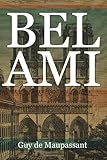Bel-Ami by Guy de Maupassant
Posted on January 1, 2013 in Books
I started reading this book in original French while living in France in the summer of 2010. I managed one chapter and then I had to return to the local library. I try to read one French book a year, but it’s more like I read one French every three years. This was the last French book I tried to start and I tried reading it over two years ago! With the Classics Club, I thought I would revisit this classic of French literature.
French is not necessarily an easy language to read and an even harder language to write. I have been lucky that my comprehension in French has always been good since I took immersion as a teenager, but even then, I am not completely fluent in reading in it.
People were telling me that the best way to read in another language is to read books translated into said language, but there are not many books that I want to read in French since many of them are in English or in the older, original French. One of my favourite French authors is Dumas, but I have largely read his books in English though I have reread some of the Count of Monte Cristo in French.
I read much slower in French than in English. I can’t quantify how much slower, but this book in English would have taken me one weekend day. I read the chapters in French then skimmed Project Gutenberg’s translation to verify.
This is a novel about Paris social life in the 19th century. Paris has and always will be an all-consuming place. The protagonist is very poor at the start of the story. Georges Duroy is apparently extremely good looking, charismatic, ambitious, but he also seems to be stupid and easily becomes conceited even at the beginning. It is funny to read in the beginning how transparent the characters and their motivations are. It is very much a critique of Paris life and a political satire. While the story is unique to the setting, a lot of the themes of social climbing, intrigue, and sex are still happening in political circles across the world.
Georges is an amoral, womanizing jerk. Even though he is described as being exceedingly handsome and probably charismatic, I couldn’t imagine it since he has such unpleasant personal qualities. He becomes increasingly greedy, entitled and egotistical as the novel progresses. I feel sorry for all the women in this novel who are fooled by him in one way or another.
The women are the supporting characters and the two main women: his wife Madeleine and his mistress Clothide are infinitely better people than Georges will ever be. Madeleine is brilliant. If not for her sex, she would be publicly recognized for her political skill. Even worse, he is ungrateful for the women in his life who have made him who he is and thinks he did it all by himself. It does showcase the double standards in that society. Still, not many of the women come off looking particularly likeable either.
If one compares this to an English or American novel of the same period, this novel had more “I love you’s” and “I adore you’s”. Also the writing style is brief and more concise. Maupassant is an efficient writer and this novel is shorter than most others of its time.
It is not completely fair for me to judge the prose and language since I have probably only read about a dozen French novels in my life (compared to hundreds I’ve read in English). Compared to the bits of Dumas I have read in French, this one is easier for the French reader, but it’s not something I would recommend to a novice just based on some of the vocabulary and references.
Having said that, Maupassant is a great writer. Admidst the politics and back stabbing and hypocrisy, there satire and keen observations of people. There is surprisingly, a moving death scene in the middle of the novel. It is has some lovely descriptions of the beautiful ladies and the country scenes. French lends itself to this kind of floral and artistic style. I did like the prose.
The only thing I was really dissatisfied with is the ending which was very abrupt. It just ended right there. Otherwise, I would recommend this classic for those keen on French literature and political satire.
I used the Project Gutenberg version as an English reference to the plot, but I would not recommend it as a good translation. It covers the plot, but like many translations, it misses the nuances, allusions and finer details of the original.
On a final note, I didn’t realize until halfway through this novel that there was a film adaptation of this novel this year in English. I tend to read the book and watch the adaptations, but given the fact that this movie was badly received and I’m not itching to watch Robert Pattinson play Duroy, I’ll pass on this movie.
Started reading in book form in summer 2010 (one chapter), restarted reading October 2012, switched to Kindle after a couple of chapters, and finished New Year’s Eve December 30 2012.
